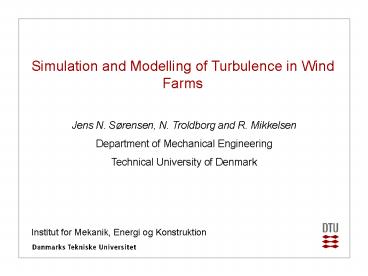Simulation and Modelling of Turbulence in Wind Farms - PowerPoint PPT Presentation
1 / 23
Title:
Simulation and Modelling of Turbulence in Wind Farms
Description:
Left: Vorticity contours; Right: ?2 criteria. Wind Turbine Wake Aerodynamics ... Iso-vorticity contours in the final stage. Simulation of turbulence inside wind farm ... – PowerPoint PPT presentation
Number of Views:61
Avg rating:3.0/5.0
Title: Simulation and Modelling of Turbulence in Wind Farms
1
Simulation and Modelling of Turbulence in Wind
Farms
Jens N. Sørensen, N. Troldborg and R.
Mikkelsen Department of Mechanical
Engineering Technical University of Denmark
Institut for Mekanik, Energi og Konstruktion
2
Wake Aerodynamics
Wake development
?
Near wake
Far wake
Axial velocity
Turbulence intensity
3
Wake Aerodynamics
Wake development
- Near Wake
- - Flow dominated by tip and root vortices
- - The number of blades and load shape
visible in the flow - - Modelling by BEM or vortex methods
- Far Wake
- - Flow dominated by turbulence
- - Only the thrust can be felt
- - Modelling using similarity assuming
self-preserving flow
4
The actuator line technique
Basic idea
- Replace rotor blades by body forces
- Determine body forces from aerofoil data
- Simulate flow domain using DNS or LES
- Computing code EllipSys3D
Body forces
Inflow
Outflow
5
EllipSys3D
Developed in close collaboration between DTU (J.
Michelsen) and Risø (N.N. Sørensen)
- Incompressible Navier-Stokes, 2D and 3D
- Block structured Multi block / Multi grid
- Parallelized using MPI Up to 50mill. points
possible - Turbulence models K-e, K-?, DES, LES, 3D
Transition - Computer facility 210 CPU-node cluster
6
The Actuator Line Technique
- Regular 3D Grid
- Vr?z Linear interpolation
- No tip correction is applied
Forces smeared out
MEK
Technical University of Denmark
Fluid Mechanics Section
7
Aerodynamic Forces
Evaluation of velocities
Evaluation of aerodynamic forces
Smearing of forces
MEK
Technical University of Denmark
Fluid Mechanics Section
8
Vortex structures in the wake of a rotor
Downstream development of wake behind single wind
turbine. Upper figure W0 6 m/s Mid figure
W0 10 m/s Lower figure W0 14 m/s. In all
figures the rotor is located to the left.
9
Vortex structures in the wake of a rotor
Downstream development of wake behind single wind
turbine. Left figure W0 6 m/s Mid figure W0
10 m/s Right figure W0 14 m/s.
10
Vortex structures in the wake of a rotor
Downstream development of wake behind single wind
turbine. Upper W0 6 m/s Mid W0 10 m/s
Lower W0 14 m/s. Left Vorticity contours
Right ?2 criteria
11
Wind Turbine Wake Aerodynamics
Wake and park interference
- In Europe it is expected than more than 20 of
the electricity consumption will come from
renewable energy sources - Europe is densely populated and wind parks will
mainly be located offshore - There is an increasing need for establishing
knowledge regarding wake and park interference - Two 200 MW offshore wind farms have recently been
established in Denmark
12
Wind Turbine Wake Aerodynamics
Vindeby off-shore wind farm
13
Vortex structures in the wake of a row of rotors
Development of wake behind three rotors in a row
at W0 10 m/s Turbine spacing 6 rotor radii.
Computed mean wake deficit profiles downstream
a) rotor 1 b) rotor 2 c) rotor 3.
14
Vortex structures in the wake of a row of rotors
Temporal variation of power coefficients
Frequency spectra of velocity signals obtained on
the tip of the second and third rotor when the
wind is in line with the row and the distance
between the rotors are 10R.
15
Simulation of turbulence inside wind farm
Basic idea
- Replace rotor blades by body forces
- Determine body forces from aerofoil data
- Simulate an infinite row of turbines using
cyclic boundary conditions
Body forces
Cyclic b.c.
Cyclic b.c.
16
Simulation of turbulence inside wind farm
Cross sectional turbulent flow fields
Iso-vorticity contours in the final stage
17
Simulation of turbulence inside wind farm
Mean velocity field
Azimuthal velocity
Axial velocity
18
Simulation of turbulence inside wind farm
Reynolds stresses
19
Simulation of turbulence inside wind farm
Reynolds stresses
20
Proper Orthogonal Decomposition
Reconstruction of velocity field
Amplitude function for mode i at time t
Spatial mode i
Galerkin projection on the Navier-Stokes
equations
21
Reconstruction of turbulence inside wind farm
Proper Orthogonal Decompositon
POD Mode 1
POD Mode 3
POD Mode 2
POD Mode 8
22
Proper Orthogonal Decomposition
Amplitude coefficients
POD Energy vs mode number
23
Wind Turbine Wake Structures
Summary
- A numerical wake model has been developed
- The model enables to study single wake behaviour
as well as the interaction of wakes from a
multiplicity of wind turbines - The computations demonstrate that the second wind
turbine in a row is the one mostly exposed to
fatigue problems - A turbulence generator based on POD
reconstruction of computed wake structures has
been developed - The next step is to carry out parametrical
studies on turbine spacing, wind shear and free
stream turbulence































